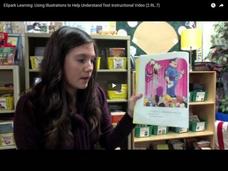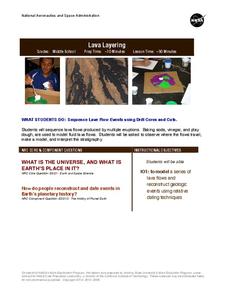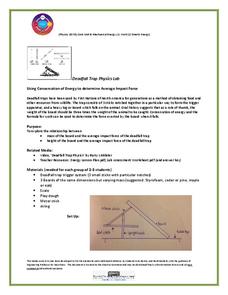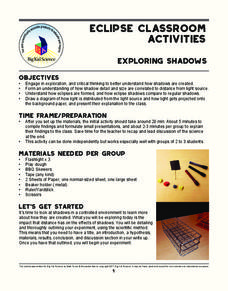Columbus City Schools
The Mystery of Earth’s History
Every living creature can leave a fossil record, yet most fossils belong to extinct organisms rather than ones currently living. Scholars learn about dating rock layers, fossils, and the environment of the past. Pupils understand that...
Curated OER
PBS Kids Go Buster Buster and Beatrice/ The Giant Pumpkins
Second graders visit San Antonio, Texas and Mt. Hood, Oregon in these two episodes of PBS Buster Go Kids. They examine the music and food that is local to San Antonio by looking at images and pretend to play instruments. They use...
Curated OER
Whole Child: Parenting Skills
Students and parents participate in a variety of activities intended to develop both the growth of the child and the parenting skills of the adult. They role-play daily activities, manipulate dough, discuss the rights and...
Curated OER
Water and Ice
Learners conduct an experiment. In this forms of water lesson, students observe ice to see what changes take place and then write in their journal about what they observed.
Software Smoothie
Imagination Box - Colors, Shapes, Numbers and Letters
This app provides young learners with opportunities to be creative while they work with different colors, letters, numbers, and shapes.
Curated OER
Stem Cell Development
Like a fresh canvas, stem cells can turn into almost anything. In a comprehensive lesson, high school biologists use clay to build a 3-D model of cell division and the processes that occur during the first 14 days of development. Also...
Curated OER
Understanding Lava Layers
Seventh graders view "Volcano" by National Geographic Video. They experiment with baking soda and study lava flow. They describe volcano and earthquake patterns. They analyze weather and climate changes and how they relate to the natural...
University of Utah
Geometry Part 2: Measurement in 2- and 3-Dimensions, Plane Sections of Solids
What kind of tree does a math teacher climb? A geometry! Here is a lesson that includes all the geometry resources you could ever wish for in one comprehensive workbook. Class members demonstrate what they have learned by...
NASA
Lava Layering
Take the old baking soda and vinegar volcano to the next level by using it to study repeated lava flows over time, examine geologic features on Earth and Mars, and speculate about some of the formations on Mars.
Cornell University
Beam Focusing Using Lenses
Explore optics using an inquiry-based experimental approach! Young scholars use a set of materials to design and build a unit capable of focusing a beam of light. They experiment with different lenses to determine the best approach to...
US Department of Agriculture
Sink or Float?
Will it sink or will it float? Learners predict the outcome as they drop random objects into a container of water. Then, they keep track of the results and record the data in a t-chart to draw a final conclusion.
Channel Islands Film
Cache: Lesson Plan 1 - Grades 9-12
Archaeologists have discovered a cache of Native American relics. They want to preserve these relics by removing them from the rapidly eroding site to a lab where they can be studied. Native American traditions demand that the items...
Curated OER
Language Arts: Scavenger Word Hunt
Participate in a scavenger hunt to find objects beginning with a particular letter sound and take digital photos of them with your scholars. Using software, they find word pictures beginning with particular letters and locate picture...
Curated OER
Scale/Ratio
Investigate the use of ratios in scale drawings. Learners scale objects up or down using ratios then find the actual size of something using ratios. They apply their knowledge of ratios as they make their own telescopes in science...
University of Colorado
The Jovian System: A Scale Model
Jupiter has 67 moons! As the seventh in a series of 22, the exercise shows learners the size and scale of Jupiter and its Galilean moons through a model. They then arrange the model to show how probes orbited and gathered data.
Polar Trec
Ice Cores: Modeling Ice Sheets
Ice cores provide scientists with knowledge of historic melt layers, air temperatures, greenhouse gases, and climate stability. Scholars work in groups to build layers representing snow and ice over thousands of years. Then, groups...
University of Saskatchewan
Using Conservation of Energy to Determine Average Impact Force
Explore the center of gravity with your science class as they create a deadfall trap with common materials. They research the concepts of energy conservation and gravitational force before dividing into small groups to create a model of...
Channel Islands Film
Cache: Lesson Plan 2 - Grades 4-6
Class members will dig this activity that has them trying their hand at recovering artifacts. Groups are assigned a section of a sandbox, carefully uncover the artifacts in their section, and then develop theories about who might...
Big Kid Science
Exploring Shadows
What's that lurking in the shadows? An activity that demonstrates how eclipses happen. Science scholars investigate how light and distance interact to form shadows. The experiment uses simple materials to generate data and observations...
Curated OER
Children's Literature Across the Curriculum Ideas-Hanukkah Lights, Hanukkah Nights
Students read Hanukkah Lights, Hanukkah Nights by Leslie Himmelman. They complete a variety of cross-curricular activities surrounding the study of Hanukkah. Included are reading, art, math, science, writing, social studies, and library...
Perkins School for the Blind
Chromosome Models- Karyotyping
Create your own karyotypes with clay in a kinesthetic genome activity. This tactile experience was created for visually impaired pupils, but can be used for all hands-on learners who are beginning to study chromosomes. The preparation...
Curated OER
A Feature Presentation - Geographic Landforms
Young scholars investigate, identify and compare the various geographic terms that can be used to describe the landforms occurring in the Hawaiian islands.
Curated OER
Aerosol Lesson: Language Arts
Students construct a model of a volcano. They read "NASA Facts Atmospheric Aerosols" and discuss the impacts of volcanic eruptions. They write informative essays about how aerosols impact the Earth.
Curated OER
Making a Thermometer
Learners observe a demonstration of how a thermometer functions. They apply the scientific method while determining which of three cups hold the coldest water. They write a hypothesis before conducting the experiment and gather data.
Other popular searches
- Mixing Colors Play Dough
- Play Dough Math
- Rock Cycle Play Dough
- Activities With Play Dough
- Play Dough Activities
- Making Play Dough
- Play Dough Sculptures
- Play Dough Models
- Play Dough Economics
- Play Dough Math Patterning
- Play Dough Neuron
- Play Dough Lesson Plans























